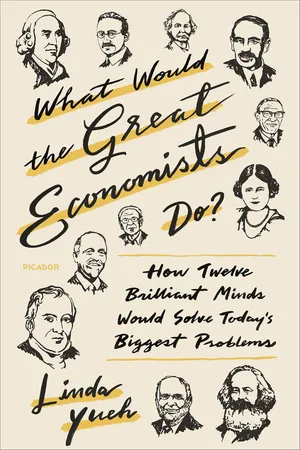
What Would the Great Economists Do?
How Twelve Brilliant Minds Would Solve Today's Biggest Problems
- 362 pages
- English
- ePUB (mobile friendly)
- Available on iOS & Android
What Would the Great Economists Do?
How Twelve Brilliant Minds Would Solve Today's Biggest Problems
About this book
A timely exploration of the life and work of twelve world-changing thinkers and how their ideas would solve the great economic problems we face today.
A Newsweek "Best 50 Books of the Year (So Far)" Pick
"A highly accessible and acute guide to thinking and learning from the men and woman whose work can inform and ultimately aid us in understanding the great national and global crises we're living through." —Nouriel Roubini, author of the New York Times bestselling Crisis Economics: A Crash Course in the Future of Finance
Since the days of Adam Smith, economists have grappled with a series of familiar problems – but often their ideas are hard to digest, even before we try to apply them to today's issues. Linda Yueh is renowned for her combination of erudition, as an accomplished economist herself, and accessibility, as a leading writer and broadcaster in this field. In
What Would the Great Economists Do? she explains the key thoughts of history's greatest economists, how our lives have been influenced by their ideas and how they could help us with the policy challenges that we face today.
In the light of current economic problems—and in particular economic growth—Yueh explores the thoughts of economists from Adam Smith and David Ricardo to contemporary academics Douglass North and Robert Solow. Along the way, she asks, for example, why are wages so low? How do the ideas of John Maynard Keynes, who argued for government spending to create full employment, help us think about state investment? And with globalization in trouble, what can we learn about handling Brexit and Trumpism?
What Would the Great Economists Do? includes:
Adam Smith
David Ricardo
Karl Marx
Alfred Marshall
Irving Fisher
John Maynard Keynes
Joseph Schumpeter
Friedrich Hayek
Joan Robinson
Milton Friedman
Douglass North
Robert Solow
Frequently asked questions
- Essential is ideal for learners and professionals who enjoy exploring a wide range of subjects. Access the Essential Library with 800,000+ trusted titles and best-sellers across business, personal growth, and the humanities. Includes unlimited reading time and Standard Read Aloud voice.
- Complete: Perfect for advanced learners and researchers needing full, unrestricted access. Unlock 1.4M+ books across hundreds of subjects, including academic and specialized titles. The Complete Plan also includes advanced features like Premium Read Aloud and Research Assistant.
Please note we cannot support devices running on iOS 13 and Android 7 or earlier. Learn more about using the app.
Information
Table of contents
- Cover
- Title Page
- Copyright Notice
- Dedication
- Introduction: Great Economists on Our Economic Challenges
- 1. Adam Smith: Should the Government Rebalance the Economy?
- 2. David Ricardo: Do Trade Deficits Matter?
- 3. Karl Marx: Can China Become Rich?
- 4. Alfred Marshall: Is Inequality Inevitable?
- 5. Irving Fisher: Are We at Risk of Repeating the 1930s?
- 6. John Maynard Keynes: To Invest or Not to Invest?
- 7. Joseph Schumpeter: What Drives Innovation?
- 8. Friedrich Hayek: What Can We Learn from Financial Crises?
- 9. Joan Robinson: Why Are Wages So Low?
- 10. Milton Friedman: Are Central Banks Doing Too Much?
- 11. Douglass North: Why Are So Few Countries Prosperous?
- 12. Robert Solow: Do We Face a Slow-Growth Future?
- Epilogue: The Future of Globalization
- Acknowledgements
- Glossary
- Bibliography
- Notes
- Index
- Additional Praise for What Would the Great Economists Do?
- About the Author
- Newsletter Sign-up
- Contents
- Copyright